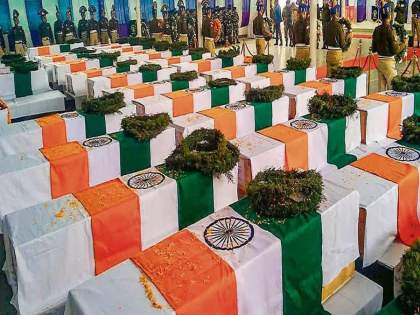Pulwama Terror Attack Anniversary: Remembrance of Tragedy and India's Vigilant Response
By Lokmat English Desk | Published: February 14, 2024 08:29 AM2024-02-14T08:29:44+5:302024-02-14T08:30:15+5:30
On 14th Feb. we celebrate Valentines Day but this day is also celebrated as a black day. On this ...

Pulwama Terror Attack Anniversary: Remembrance of Tragedy and India's Vigilant Response
On 14th Feb. we celebrate Valentines Day but this day is also celebrated as a black day. On this day one of the deadliest terror attacks carried out on its security forces, which took place in the Pulwama district of Jammu and Kashmir where at least 40 Central Reserve Police Force (CRPF) personnel lost their lives. India also considers February 14 as ‘black day’ due to the attack which bought the country to a standstill after a suicide bomber from Jaish-e-Mohammed (JeM) rammed a vehicle full of explosives into a CRPF convoy. After a few days, the Indian Air Force bombed the JeM camps in Pakistan’s Balakot sector, as per reports, hundreds of terrorists were said to have been killed during the attack.
What happened that day in Pulwama?
On February 14, 2019, a suicide bomber attacked a convoy which comprised a total of 78 buses in which around 2,500 paramilitary personnel were travelling from Jammu to Srinagar when the explosive-laden vehicle rammed into a bus killing 40 members of the CRPF. The attack took place on Jammu-Kashmir National Highway (NH) 44 at around 3:15 pm (local time). The JeM released a video claiming responsibility for the attack. The suicide bomber was later identified as 22-year-old Adil Ahmad Dar, reportedly a resident of the Pulwama district in south Kashmir.
Following the Pulwama terror attack, India strongly condemned the incident, with the Ministry of External Affairs (MEA) accusing Pakistan of providing "full freedom" to Masood Azhar, the leader of Jaish-e-Mohammed (JeM), to operate within its borders. The MEA urged Pakistan to cease support for terrorists and dismantle terror infrastructure. In response, Pakistan denied these allegations. Indian political parties passed a resolution supporting security forces and the government.
In retaliation, India took economic measures, increasing customs duty on Pakistani goods to 200% and revoking Pakistan's Most Favoured Nation (MFN) status. Prime Minister Narendra Modi gave security forces the "full freedom" to decide the "time and place" for the "future course of action," warning that terrorists would face a "heavy price" for their actions.
As part of 'Operation Bandar,' Indian security forces conducted airstrikes on February 26, 2019, targeting JeM camps in Balakot, Khyber Pakhtunkhwa province, Pakistan. This marked the first Indian aerial assault in Pakistan since the 1971 war.
In response, Pakistan Air Force retaliated on February 27, 2019, with F-16s attempting to target Indian military installations in Jammu and Kashmir. The Indian Air Force (IAF) successfully thwarted the attempt. During the skirmish, one F-16 and two Indian MiG-21 Bisons were reportedly destroyed. Pakistan initially claimed to have captured two IAF pilots but later revised it to one. Former PM Imran Khan announced the release of captured IAF Wing Commander Abhinandan Varthaman on March 1, who was later honored with India’s Vir Chakra, the third-highest wartime gallantry medal.
Open in app